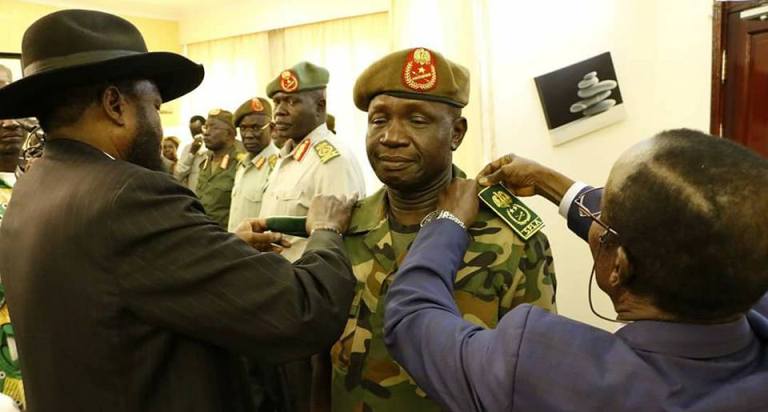South Sudanese army vows to protect rape trial witnesses

September 2, 2017 (JUBA) – The South Sudanese army has vowed to protect witnesses willing to testify before the military court against soldiers accused of raping foreigners at a hotel in the capital, Juba.
“We have no problem with anyone coming out to testify before the court. The issue of the safety of the witnesses was discussed at the command council and it was agreed that the witnesses would be accorded all protection they want. If they do not want to come to the country, they can testify through video link,” the army chief of staff, Gen. James Ajonga told Sudan Tribune Saturday.
He added, “So let no one feel they will be targeted. The command has granted protection”.
The army chief said recent decisions of the command council to restructure the army are parts of the general efforts to overhaul and reshape the institution so that it moves towards a professional army in which the ground, riverine and air force are equally represented.
“Just give us time and our people will appreciate the result of their patience. They stood with their sons during the war of liberations when they were the source of their strength. We want them to not be disappointed by the actions of individuals on which we are working to improve so that there is a discipline in the army”, he said.
The top military officer revealed that the command council, in which he currently sits, recently unveiled strategic plans to reorganizing the military headquarters, re-zoning the military commands, setting up new strategic zones and joint operation command systems.
Other areas, according to Ajonga, include strengthening the country’s central military leadership command structure, imposing strict discipline on the army, pushing for more innovation, reforming personnel management system and pushing for integration between the building of national defence and economic development.
The army chief of staff general urged the civil population to work together so that the military institution can be professionalised.
“Instead of continuing to blame the soldiers, we need to work together because the people we are blaming [are] our brothers, our sons, husbands and above all our fellow citizens. And more importantly, what I always emphasize is that these soldiers are there for you, for me and the whole country,” further stressed Ajonga.
“We don’t work together with them to correct and make an adjustment, then we have failed in our roles as the citizens and we shall always allow ourselves to be consumed by accusations and justifications”, he added.
The senior army official was reacting to queries on what military leadership was doing to protect the image of the army by identifying elements accused of gang raping foreign nationals and vandalizing Terrain hotel when fighting erupted in July 2016 between government forces and fighters loyal to the rebel leader, Riek Machar.
The trail of the accused soldiers, observers say, would be a key test of accountability in a country where impunity is pervasive. Those accused of atrocities never appeared in public before the court.
In the July incident, 12 South Sudan soldiers were accused of gang-raping five foreigners, killing a local journalist while forcing survivors to watch and looting the Terrain hotel compound in the capital, Juba.
The trial of the accused South Sudanese soldiers almost collapsed when judges at the military court threatened to dismiss the charges of rape and murder unless the foreign victims and witnesses testified. The same judges initially rejected the possibility of remote testimony via online video interviews, but have now accepted after directives from the command council permitted testifying through a video link.
(ST)
